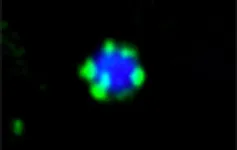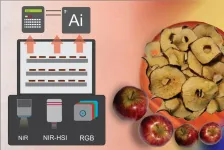(Press-News.org) Recycling takes place in our cells at all times: in a process called autophagy, cell components that are no longer needed are enclosed by membranes and broken down into their basic building blocks. This vital process prevents the formation of harmful aggregates and makes nutrients available again. A research team co-led by Prof. Dr. Claudine Kraft from the CIBSS Cluster of Excellence at the University of Freiburg and Dr. Florian Wilfling from the Max Planck Institute of Biophysics in Frankfurt has now discovered the conditions necessary for autophagy to start. They were also able to artificially create these conditions and thus trigger the degradation of otherwise non-degradable molecules in yeast cells. Targeting autophagy in this way is a promising approach for promoting the degradation of aggregates that can otherwise form plaques in neurodegenerative diseases such as Alzheimer‘s, as well as to improve the efficacy of cancer treatments. The study has been published in the scientific journal Nature Cell Biology.
Weak molecular interactions essential for autophagy to begin
In order for the degradation of cellular components through autophagy to occur, they must first be recognised as waste. This is done by receptor and other adapter molecules. However, it was previously unknown how exactly these molecules trigger the subsequent steps. “We have now been able to show that the receptors must bind weakly to the material to be disposed of for autophagy to start,” explains Kraft. “If they bind too strongly, the process is not triggered.”
What initially sounds counterintuitive could be explained by the researchers with the help of computer simulations and experiments on living yeast cells and human cells in cell culture: the weak binding causes the receptors to remain mobile and form random clusters. “When the point of critical concentration has been reached, phase separation occurs: the adapter molecules come together and form a droplet, similar to oil in water,” explains Wilfling. “Such a liquid accumulation has different physical properties than the individual molecules serving as a flexible platform for all other molecules involved in autophagy.”
The process can be controlled artificially
To test their hypothesis, the researchers introduced virus particles into yeast cells that the cells are normally unable to break down. By modifying the virus particles so that autophagy receptors could weakly bind to them, the researchers were able to trigger the degradation of the viral protein. However, if they modified the surface so that the receptors bound strongly to it, no degradation took place. “This result is promising because it shows that we can specifically intervene in the autophagy of cargo molecules of living cells,” summarise both Kraft and Wilfling.
Overview of facts:
Original publication: Mariya Licheva, Jeremy Pflaum, Riccardo Babic, Hector Mancilla, Jana Elsässer, Emily Boyle, David M Hollenstein, Jorge Jimenez, Jonas Pleyer, Mio Heinrich, Franz-Georg Wieland, Joachim Brenneisen, Christopher Eickhorst, Johann Brenner, Shan Jiang, Markus Hartl, Sonja Welsch, Carola Hunte, Jens Timmer, Florian Wilfling, Claudine Kraft (2024). Phase separation of initiation hubs on cargo is a trigger switch for selective autophagy. In: Nature Cell Biology. DOI: 10.1038/s41556-024-01572-y
Prof. Dr. Claudine Kraft is a researcher at the Institute of Biochemistry and Molecular Biology at the University of Freiburg and a member of the CIBSS – Centre for Integrative Biological Signalling Studies Cluster of Excellence. Dr. Florian Wilfling is a researcher at the Max Planck Institute of Biophysics in Frankfurt am Main.
The study was funded by the German Research Foundation (EXC-2189; SFB 1381; SFB 1177; 450216812; 409673687; GRK 2606;) by the European Research Council under the Horizon 2020 programme (ERC 769065), the Max Planck Society and by the European Union (ERC 101041982).
Contact
University and Science Communications
University of Freiburg
Tel.: +49 761 203 4302
E-Mail: kommunikation@zv.uni-freiburg.de
END
Researchers have a better understanding of how our cells dispose of waste while developing ways to control it
2025-01-07
ELSE PRESS RELEASES FROM THIS DATE:
Earth’s air war: Explaining the delayed rise of plants, animals on land
2025-01-07
New Haven, Conn. — If you like the smell of spring roses, the sounds of summer birdsong, and the colors of fall foliage, you have the stabilization of the ozone layer to thank for it. Located in the stratosphere, where it shields the Earth from harmful ultraviolet radiation, the ozone layer plays a key role in preserving the planet’s biodiversity.
And now we may have a better idea of why that took so long — more than 2 billion years — to happen.
According to a new, Yale-led study, ...
More than half of college students report alcohol-related harms from others
2025-01-07
FOR IMMEDIATE RELEASE
Tuesday, January 7, 2025
Contact:
Jillian McKoy, jpmckoy@bu.edu
Michael Saunders, msaunder@bu.edu
##
More than half of US college students experienced alcohol-related harms caused by others, according to the first national probability-based survey of such harms conducted in 20 years. The findings, published in the journal Drug and Alcohol Review in December, shed light on how others’ drinking affects students’ health, academics, and safety.
“Our research ...
Smart food drying techniques with AI enhance product quality and efficiency
2025-01-07
URBANA, Ill.– Food drying is a common process for preserving many types of food, including fruits and meat; however, drying can alter the food’s quality and nutritional value. In recent years, researchers have developed precision techniques that use optical sensors and AI to facilitate more efficient drying. A new study from the University of Illinois Urbana-Champaign discusses three emerging smart drying techniques, providing practical information for the food industry.
“With traditional drying systems, you need to remove samples to monitor the process. But with smart drying, or precision drying, you can continuously ...
Typical cost of developing new pharmaceuticals is skewed by high-cost outliers
2025-01-07
The typical cost of developing new medications may not be as high as generally believed, with a few ultra-costly medications skewing public discussions about the cost of pharmaceutical research and development, according to a new RAND study.
Using a novel method to assess spending on research and development for 38 drugs that were recently approved by the U.S. Food and Drug Administration, researchers found that the mean, or average, cost of developing a new drug was much higher than the mid-point (median) cost of development.
Researchers estimated a median direct research and development cost of $150 million compared to a mean of $369 million.
Costs ...
Predicting the progression of autoimmune disease with AI
2025-01-07
HERSHEY, Pa. — Autoimmune diseases, where the immune system mistakenly attacks the body’s own healthy cells and tissues, often have a preclinical stage before diagnosis that’s characterized by mild symptoms or certain antibodies in the blood. However, in some people, these symptoms may resolve before culminating in the full disease stage.
Knowing who may progress along the disease pathway is critical for early diagnosis and intervention, improved treatment and better disease management, according to a team led by researchers from the ...
Unlocking Romance: UCLA offers dating program for autistic adults
2025-01-07
Love doesn’t come with an instruction manual, but for autistic adults seeking to navigate the complexities of romance, a UCLA Health program offers a roadmap to finding and sustaining meaningful relationships through the launch of a new research study, called PEERS for Dating.
Led by the UCLA Program for the Education and Enrichment of Relationship Skills (PEERS) Clinic, the new 20-week program aims to demystify the often complex social rules surrounding dating and help participants gain a deeper understanding of relationship dynamics
“Romantic relationships can be transformative, but for many autistic adults, the path to connection can feel uncertain,” ...
Research Spotlight: Researchers reveal the influences behind timing of sleep spindle production
2025-01-07
How would you summarize your study for a lay audience?
Our research focuses on sleep spindles—short bursts of brain activity during sleep that are crucial for stabilizing sleep and supporting memory.
Sleep spindles are of great interest because changes in spindle activity have been linked to many neurodevelopmental and neurodegenerative disorders, such as Alzheimer’s disease and autism.
While many factors influence when and how these spindles occur, such as sleep stages or brain rhythms, we discovered that short-term patterns, like a musical rhythm spanning just a few seconds, play the most ...
New research reveals groundwater pathways across continent
2025-01-07
Researchers from Princeton University and the University of Arizona have created a simulation that maps underground water on a continental scale. The result of three years’ work studying groundwater from coast to coast, the findings plot the unseen path that each raindrop or melted snowflake takes before reemerging in freshwater streams, following water from land surface to depths far below and back up again, emerging up to 100 miles away, after spending from 10 to 100,000 years underground.
The simulation, published Jan. 6 in the journal Nature Water, shows that rainfall and snowmelt ...
Students and faculty to join research teams this spring at Department of Energy National Laboratories and a fusion facility
2025-01-07
WASHINGTON, D.C. - A diverse group of 164 undergraduate students and six faculty will participate in unique workforce development programs at 11 of the nation’s national laboratories and a fusion facility during Spring 2025.
This opportunity is part of a continuing effort by the Department of Energy (DOE) to ensure the nation has a strong, sustained workforce trained in the skills needed to address the energy, environment, and national security challenges of today and tomorrow.
“The ...
SETI Forward recognizes tomorrow’s cosmic pioneers
2025-01-07
January 7, 2025, Mountain View, CA -- The SETI Institute announces the 2024 SETI Forward Award recipients: Gabriella Rizzo and Pritvik Sinhadc. This year's recipients worked on research projects to understand extremophiles in deep-sea hydrothermal vents and to analyze gravitational wave signals for potential extraterrestrial technosignatures. Established by Lew Levy, SETI Forward committee founder and member of the SETI Institute’s Council of Advisors, this award is a beacon for promising young scientists. The goal is to connect students with opportunities that foster their ...





